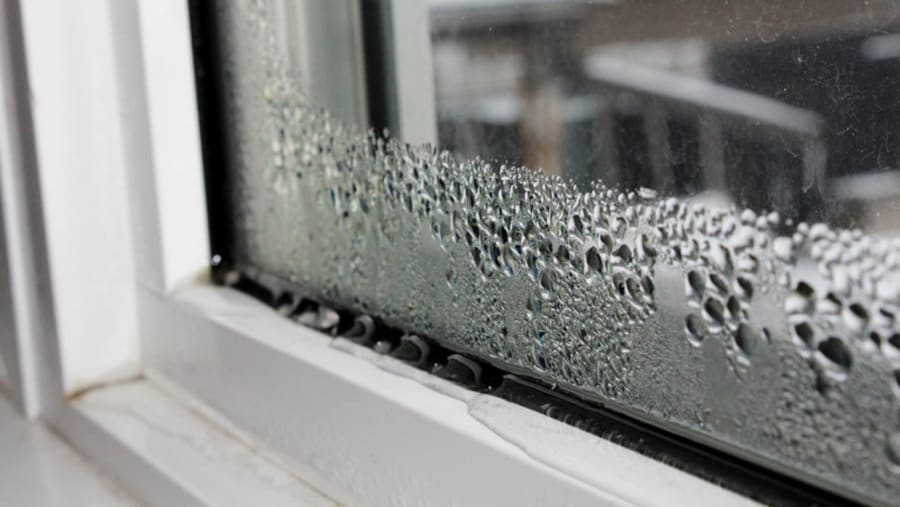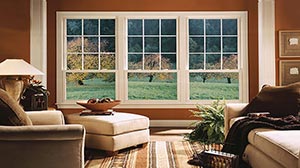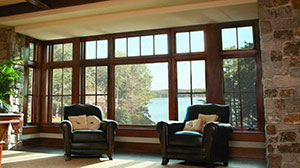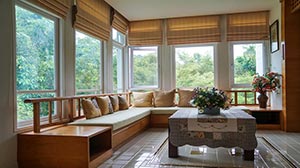
‘Sweating’ windows are common in homes, especially in the winter. When humid air inside the house comes into contact with the cold glass, it cools and condenses. This causes moisture to settle either on the window or between the panes. Right now, you may be wondering how to stop this from happening?
So, what can you do to stop windows from sweating? There are several ways to stop windows from sweating. These include:
- running fans in the bathroom when showering or bathing
- using vented fans in the kitchen while cooking
- installing storm windows
- replacing single-pane windows with the insulated double or triple-pane windows
- putting plastic sheeting on windows
- using a dehumidifier in your home
- circulating the air with ceiling fans
- running the heating and cooling system on auto settings to maintain optimal interior temperatures
- getting your heating and cooling system routinely serviced to make sure everything is working properly
Now that you know how to stop windows from sweating let’s explore the ways in more detail below. We will also discuss how to lower the humidity in your home, how to use a common household item like baking soda to reduce moisture, the difference between double and triple glazing, and the effects of mold and condensation on your health. So, if you’re ready to learn more, then let’s get started!
Will Plastic on Windows Stop the Sweating?
Energy-efficient homes that are well-sealed against air leaks have one downfall – condensation on windows. This moisture build-up on the glass can make your home feel damp, ‘muggy,’ and uncomfortable and lead to possible mold growth if not careful. Putting a layer of plastic sheeting over your windows can help stop winter condensation from causing a problem in your home.
A plastic film on windows will stop condensation by creating a barrier between the glass and the surrounding air. The plastic also adds an extra layer of insulation, which can save you money on energy bills.
It is important to note that plastic sheeting is not a permanent fix, and it’s often not pretty to look at. It should be used temporarily until you can either replace the weather stripping around the edges to find another way to better seal the windows.
An alternative semi-permanent repair would be installing window tinted plastic, such as in window tinting on the windows’ interior. This can also reduce radiant heating caused by direct sunlight, which can lower heating and cooling costs.
Nine Ways to Stop Condensation on Windows in Winter
Besides putting plastic on windows, there are several ways to stop condensation in the winter. These include the following:
1. Running a Ventilation Fan in the Bathroom
Be sure to have a working ventilation fan in your bathroom and turn it on every time you bathe or shower. This will remove the moist air and prevent it from settling on windows, resulting in condensation.
Be sure the ventilation fan is vented outside of the home and not into the attic or wall cavity. Moist air vented into the attic can cause mold problems to develop.
An air exchanger in the bathroom will exhaust heat and moisture and draw fresh air back into the home.
2. Using a Vented Fan in the Kitchen.
A vented fan should be used whenever cooking to draw out steam and heat to collect in the air and settle on windows. The fan should be vented outside rather than into the attic as this can cause potential mold problems in your home.
3. Installing Storm Windows over Single Paned Glass Windows
A storm window is one that is mounted outside the main glass window. It acts as a retrofit over existing single-pane windows to improve thermal insulation and prevent condensation. If you have single-pane windows, installing storm windows will help reduce humidity and save energy.
4. Replacing Single-Pane with Double or Triple-Pane Windows
Multiple panes of glass in windows create a better insulating barrier. This helps reduce condensation by allowing less heat to escape your home. It also saves you money on heating bills.
Double and triple-pane windows contain a gas sealant that prevents condensation between the glass panes. It is a good investment to replace single-pane windows with double or triple-pane units if your financial situation allows.
5. Retrofitting Old Windows with Safety Glass
Saving old vintage single-pane windows in homes is advantageous for several reasons, particularly historical value.
Replacing single-pane glass with safety glass has a higher R-value. Many preservation contractors couple this improvement with the installation of wood storm windows. This combination preserves the historic windows and, in many cases, raises the window’s R-value equal to or exceeding triple-pane windows.
6. Using a Dehumidifier
A dehumidifier reduces (and maintains) the level of humidity in the air. This helps eliminate odors in your home as well as prevents condensation on your windows. You can purchase a portable unit or a whole-home unit installed.
7. Circulating the Air Inside Your House
Using ceiling fans to circulate the air is a good way to reduce humidity in your home and moisture build-up on the windows. If you do not have ceiling fans, using oscillating or box fans can have the same result.
8. Having Your Heating and Cooling System Serviced
To keep the moisture in your home under control, be sure to have our heating and cooling system routinely serviced by a professional heating and cooling contractor. The relative humidity should be no higher than 40%. If you’ve tried the other suggestions mentioned above and you still have a problem with condensation, then call someone in to take a closer look.
9. How to Stop Glass Doors from Sweating
One way to stop glass doors from sweating is to treat the glass with vinegar and water. The three simple steps to do this yourself include:
- Create a mixture that includes equal parts of water and vinegar in a spray bottle.
- Spray the mixture directly onto the glass in the door
- Take a clean, dry paper towel and wipe the glass down
After being treated, the glass on the door will resist both fogging and condensation better than before. This is an easy and affordable do-it-yourself solution. Why not give it a try?
How You Can Lower Humidity in Your House
Lowering the humidity in your home will help prevent moisture build-up on your windows. A few easy ways to do this include:
- Making sure your dryer duct is vented directly to the outside
- Running exhaust fans in areas of high humidity, including your kitchen and bathrooms
- Using a portable dehumidifier or a whole-home dehumidifier (if the relative humidity is 65% or more)
- Growing plants that absorb moisture in the air such as Boston ferns
- Not boiling water on humid days
- Hanging wet clothes to dry outside the home rather than inside
- Cleaning your air conditioning filters regularly
- Taking colder, shorter showers
- Not taking hot baths on humid days
- Replacing your carpets with laminate or hardwood flooring (as a last resort)
Does Baking Soda Draw Out Moisture?
Using Baking soda on carpets and rugs will help eliminate excess moisture in the air and prevent condensation on your windows. Sprinkle baking soda lightly onto your carpet (or rug) and let it sit for several hours. Then, vacuum it up. What could be easier?
Does Double Glazing Stop Condensation?
When double glazing is installed, thermal insulation between the inside and outside is greatly enhanced. This reduces condensation and keeps the home warmer, drier, and healthier. The amount of condensation at the edge of a window frame with double glazing is greatly influenced by the frame’s core material. Timber window frames are highly recommended for their excellent insulating properties.
Does Triple Glazing Stop Condensation?
Double and triple glazing use multiple panes of glass to make windows more energy-efficient. Triple glazing is designed to reduce heat loss and condensation by approximately 40% better than PVC windows with double glazing. This results in much higher energy savings. Triple glazed windows are essentially the same as double glazed units but with one extra pane of glass.
Can Drafty Windows Cause Condensation?
Contrary to popular belief, condensation on windows is not always caused by defective or poorly-insulated windows but rather the home’s excessive moisture levels. Old or drafty windows allow the humidity to escape, along with the heat, which can be costly when it comes to energy bills.
Correct Windows that are Painted Shut
It’s common in older homes to find single pane windows painted shut, rendering them inoperative. Much like as stated above, older windows can be drafty, allowing air and humidity to escape. Windows that are painted shut prohibit the natural flow of air around the windows.
Freeing windows that are painted shut will restore airflow around the windows and reduce condensation from single-pane windows sweating during winter and summer months.
Is Condensation on Windows Bad for Your Health?
High humidity in homes can cause mold on walls and furniture and can even rot your window frames. This is an unhealthy situation. Exposure to moldy environments can cause several side effects, including nasal congestion, throat irritation, eye redness, skin rashes, coughing or wheezing, headaches, fatigue, and asthma attacks.
Conclusion
In conclusion, condensation forms on windows when warm air is cooled. There are a variety of different ways to stop windows from sweating. These include
- turning on the fan while you bathe or shower
- using your range hood every time you cook
- installing storm window over existing windows
- replacing single-pane windows with triple-pane units
- putting plastic sheeting over windows
- using a portable or whole-home dehumidifier
- circulating the air with fans or turning on the air conditioner
- having your heating and cooling system inspected to make sure everything is functioning correctly
Hopefully, this article has helped you better understand how to prevent windows from sweating. Good luck with your future home endeavors.





